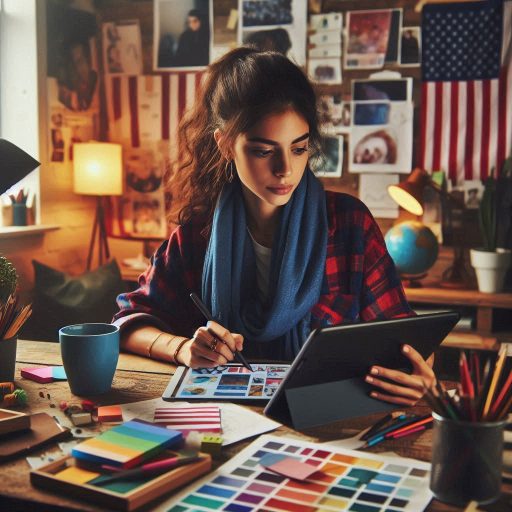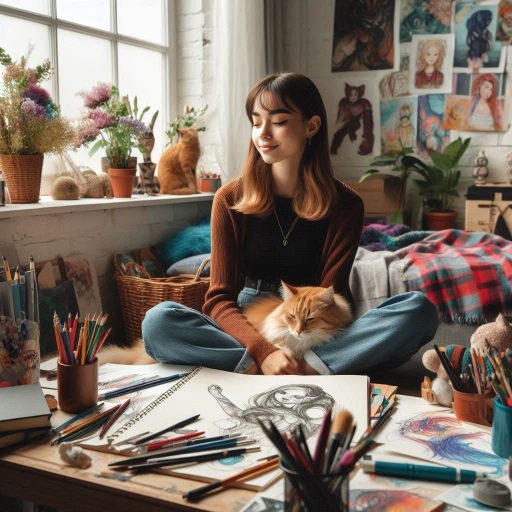Introduction
Concept art is essential in industries like video games, films, and animation, forming the foundation for visual storytelling.
It involves creating imaginative visuals for characters, environments, and props.
Concept artists are responsible for transforming ideas into visual concepts that guide production teams.
Their work ensures that every element of a project aligns with the director‘s vision.
These artists must develop unique designs that inspire and inform the final look of a project.
Concept art plays a vital role in pre-production, setting the tone for the entire creative process.
As demand for immersive content grows, the need for concept artists is increasing.
Companies rely on skilled artists to create visually engaging worlds that captivate audiences.
The creative industry offers concept artists opportunities in video game studios, animation companies, and film production houses.
With more projects requiring innovative design, concept artists are in high demand.
This field offers diverse career paths, from freelance work to full-time studio positions.
Aspiring artists with strong visual skills and creativity can find exciting and rewarding opportunities in this ever-evolving industry.
Develop your artistic skills
The importance of honing your drawing and painting skills to become a successful concept artist
To become a successful concept artist, honing your artistic skills is crucial.
Strong drawing and painting abilities form the foundation of captivating visual concepts.
Without these skills, your ideas may not translate effectively to paper or digital formats.
Therefore, commit to developing your abilities through consistent practice.
Practice Regularly
Regular practice enhances your skills and builds confidence.
Set aside dedicated time each day to draw or paint.
Treat these sessions as essential appointments.
Start with simple sketches, then gradually increase complexity.
This consistent effort will significantly improve your technique over time.
Consider keeping a sketchbook to track your progress.
Use it to explore new ideas and techniques without the pressure of perfection.
Study Different Art Styles
Studying various art styles broadens your understanding of artistic expression.
Explore styles such as realism, impressionism, and abstract art.
Analyze how different artists approach their work.
This knowledge will inspire you and help you develop your unique style.
Try recreating famous artworks to learn new techniques.
As you practice, focus on different elements like color, composition, and line quality.
Learning from others will deepen your appreciation for diverse artistic methods.
Experiment with Various Mediums
Experimenting with different mediums can ignite creativity.
Each medium offers unique challenges and opportunities for expression.
Try using traditional tools like pencils, charcoal, and paint.
Additionally, explore digital tools like graphic tablets and design software.
Understanding how each medium affects your artwork will enhance your adaptability as an artist.
Don‘t shy away from mixing mediums.
Combining traditional and digital techniques can yield exciting results.
This experimentation allows you to discover what resonates most with your artistic vision.
Understand the Principles of Design
Understanding design principles is essential for creating captivating concept art.
Familiarize yourself with elements such as balance, contrast, and hierarchy.
These principles guide the organization of visual elements in your artwork.
Additionally, study the fundamentals of anatomy.
A solid grasp of human and animal anatomy enables you to create believable characters.
This knowledge will enhance your storytelling abilities through visual representation.
Mastering Perspective
Perspective plays a vital role in concept art.
It helps create depth and dimension, making your artwork more dynamic.
Practice drawing objects in one-point, two-point, and three-point perspectives.
This will improve your spatial awareness and composition skills.
Incorporating perspective into your work will make it visually engaging and realistic.
Developing your artistic skills is an ongoing journey.
Regular practice, studying diverse styles, and experimenting with various mediums will elevate your abilities.
Understanding design principles, anatomy, and perspective will enhance your artistry.
By committing to this path, you lay the groundwork for a successful career as a concept artist.
Start today and watch your skills flourish!
Read: Visual Merchandising: Best Practices for Beginners
Build a strong portfolio
Creating a strong portfolio is crucial for aspiring concept artists.
Your portfolio showcases your skills, creativity, and style to potential clients and employers.
A well-curated collection of artwork speaks volumes about your abilities and professionalism.
Showcase a Range of Skills and Styles
Diversity in your portfolio highlights your versatility as an artist.
Include various projects that demonstrate your skills in different styles.
This can range from character designs to environments and props.
Showcasing multiple mediums, such as traditional painting and digital art, adds depth to your work.
Clients and employers appreciate artists who can adapt their styles to meet various needs.
A diverse portfolio increases your chances of standing out in a competitive field.
Selecting and Curating Your Best Artwork
When building your portfolio, focus on quality over quantity.
Curate a selection of your best artwork that reflects your abilities and interests.
Aim for around 10 to 20 pieces that truly represent your skills.
Choose work that resonates with you and showcases your unique voice as an artist.
Be critical of your own work; if a piece doesn‘t meet your current standards, consider leaving it out.
It‘s also beneficial to include personal projects alongside commissioned work.
Personal projects often reveal your artistic passions and creativity.
This gives potential clients insight into your interests and motivations.
Additionally, tailor your portfolio for specific job applications.
Research the companies or clients you‘re targeting and align your work accordingly.
Highlight pieces that demonstrate your ability to fulfill their needs.
Update Your Portfolio Regularly
Regularly updating your portfolio is vital for reflecting your growth and improvement as an artist.
As you learn new techniques and styles, ensure your portfolio showcases this development.
Set a schedule to review your portfolio every few months.
Replace older pieces with more recent work that exemplifies your current skills.
This practice keeps your portfolio fresh and relevant.
Additionally, consider the presentation of your portfolio.
Whether online or physical, a polished and professional appearance matters.
Invest time in creating a user-friendly website or a neatly organized physical portfolio.
Use high-quality images and consistent formatting to enhance your presentation.
A strong portfolio is essential for any concept artist.
Showcase a diverse range of skills and styles to attract potential clients.
Curate your best artwork and present it in a professional manner.
By regularly updating your portfolio, you demonstrate your growth as an artist.
Start building and refining your portfolio today to pave the way for future opportunities!
Read: Visual Merchandiser: Job Market and Opportunities
Networking and Collaboration
Networking is a vital aspect of building a successful career as a concept artist.
Establishing connections with other artists, industry professionals, and potential clients can open doors to exposure and opportunities.
Engaging with a community of creatives fosters collaboration, learning, and growth.
Importance of Networking
Networking helps you gain visibility in the art world.
The more people know about your work, the more opportunities will arise.
Establishing relationships with industry professionals can lead to mentorship and guidance.
These connections can provide valuable insights into industry trends and expectations.
Additionally, networking allows you to discover job openings and freelance opportunities.
A strong network can significantly impact your career trajectory as an artist.
Tips for Attending Conventions and Exhibitions
Attending conventions and art exhibitions is a fantastic way to meet like-minded individuals.
Research upcoming events in your area or in the industry.
Make a plan to attend, and approach these gatherings with an open mind.
Engage in conversations with fellow artists and industry professionals.
Share your work and ask for feedback; this openness fosters genuine connections.
Consider volunteering at these events to gain more exposure.
This provides networking opportunities while showcasing your commitment to the art community.
Carry business cards that showcase your contact information and portfolio link.
Having a professional presence makes it easier for others to remember you.
Utilizing Online Forums and Communities
In addition to in-person events, online forums and communities offer valuable networking opportunities.
Platforms like ArtStation, DeviantArt, and social media allow you to connect with other artists globally.
Join relevant groups or participate in discussions to share your insights and experiences.
Engaging in online challenges or collaborations can further boost your visibility.
Regularly post your work on social media, using appropriate hashtags to reach a wider audience.
Interacting with followers and other artists helps build relationships over time.
Don‘t hesitate to reach out to artists whose work you admire.
Genuine compliments and questions can initiate meaningful conversations.
Benefits of Collaboration
Collaborating with other artists on projects can enhance your skills and experience.
Working with others exposes you to different techniques and perspectives.
This exchange can push you to think creatively and improve your craft.
Choose projects that challenge you, whether it‘s illustrating a comic or designing a game character.
Collaboration also expands your network.
When you work with others, you tap into their networks as well.
This can lead to new opportunities and connections.
Moreover, collaborating can result in exciting projects that might not be achievable alone.
Sharing the workload allows for creative brainstorming and innovative solutions.
Networking and collaboration are essential for a successful career as a concept artist.
Build relationships with artists and industry professionals to gain exposure and opportunities.
Attend conventions, participate in online communities, and collaborate on projects.
Embrace these connections to enhance your skills, expand your experience, and create a vibrant artistic career.
Start networking today to unlock your full potential as a concept artist!
Read: Essential Skills for Aspiring Costume Designers
Education and Training
Education and training play a significant role in shaping your career as a concept artist.
There are various paths to explore, including traditional art schools, online courses, and workshops.
Each option offers unique advantages, allowing you to tailor your education to fit your needs.
Transform Your Career Today
Unlock a personalized career strategy that drives real results. Get tailored advice and a roadmap designed just for you.
Start NowDifferent Education Paths
Art schools provide a comprehensive education in various artistic disciplines.
Attending a traditional institution allows for structured learning and access to experienced instructors.
You‘ll gain valuable feedback and develop critical skills in a collaborative environment.
However, these programs can be costly and time-consuming.
Online courses have become increasingly popular among aspiring artists.
They offer flexibility and often at a lower cost than traditional schools.
Many reputable platforms provide courses specifically focused on concept art, character design, and environment creation.
This option allows you to learn at your own pace and fit your studies into your schedule.
Workshops provide an opportunity for hands-on experience and direct interaction with industry professionals.
These short-term courses often focus on specific skills or techniques.
Attending workshops can also help you network with other artists and gain insights into the industry.
Selecting the Right Program
When selecting a program or course, consider your artistic goals and interests.
Reflect on the specific skills you want to develop, such as digital painting or character design.
Research different programs to find those that align with your objectives.
Look for courses that emphasize practical exercises and provide constructive feedback.
Read reviews and testimonials from former students to gauge the program’s effectiveness.
If possible, reach out to alumni to ask about their experiences.
This firsthand information can help you make informed decisions.
Additionally, consider the qualifications of the instructors.
Experienced teachers can provide valuable industry insights and guidance.
The Value of Continuous Learning
In the fast-paced world of concept art, continuous learning is essential.
The industry constantly evolves, with new tools and techniques emerging regularly.
To stay competitive, commit to ongoing skill development.
Attend workshops, enroll in advanced courses, or participate in online challenges to keep your skills sharp.
Joining online communities and forums can also enhance your learning.
Engage with other artists to share techniques and resources.
This collaborative approach fosters growth and keeps you informed about industry trends.
Seek out resources such as books, tutorials, and podcasts that focus on concept art.
Staying up-to-date with industry standards will ensure you remain relevant and adaptable in your work.
Education and training are crucial for aspiring concept artists.
Explore various paths, including art schools, online courses, and workshops, to find what suits you best.
Select programs that align with your artistic goals and emphasize practical skills.
Commit to continuous learning and skill development to stay competitive in the industry.
Embrace the journey of education, and watch your artistry flourish!
Read: Famous Costume Designers in Hollywood

Discover More: What Does an Interactive Media Designer Do?
Internships and freelance work
Gaining practical experience is crucial for aspiring concept artists.
Internships at studios or companies provide invaluable hands-on learning opportunities.
They allow you to apply your skills in a real-world setting, helping you understand industry expectations and workflows.
Importance of Internships
Internships serve as a bridge between education and a professional career.
They give you the chance to work alongside experienced artists and industry professionals.
This exposure allows you to learn from their techniques, processes, and insights.
Additionally, internships help you build a strong portfolio, showcasing your work in a professional context.
Many studios value interns who bring fresh ideas and enthusiasm.
By actively participating in projects, you can contribute to creative discussions and gain practical experience.
Moreover, internships often lead to job opportunities.
Employers frequently hire interns who demonstrate talent, work ethic, and adaptability.
Finding Freelance Projects
Freelance work is another effective way to gain experience and build your portfolio.
Start by seeking small projects that align with your interests.
Websites like Upwork, Fiverr, and ArtStation can help you find freelance opportunities.
Create a compelling profile that showcases your skills and previous work.
Be proactive in bidding on projects that excite you and fit your abilities.
Consider reaching out to local businesses or startups that may need artistic support.
Offer your services for branding, marketing materials, or product design.
Networking with fellow artists can also lead to freelance opportunities.
Collaborate with others on projects, and share your work on social media to increase visibility.
Benefits of Networking
Networking plays a vital role in securing freelance opportunities and long-term contracts.
Build relationships with industry professionals through events, online forums, and social media platforms.
Attend conventions and workshops to meet potential clients and collaborators.
Engaging with others in the industry can lead to referrals and recommendations.
Join online communities focused on concept art, where you can showcase your work and seek feedback.
These platforms often host job postings and collaborations, making it easier to find opportunities.
Actively participating in discussions helps you establish your presence and credibility within the community.
Moreover, consider joining professional organizations or associations related to your field.
Membership often provides access to job boards, resources, and networking events.
This involvement can significantly enhance your chances of landing freelance gigs or long-term contracts.
Internships and freelance work are essential for aspiring concept artists.
Gaining practical experience through internships prepares you for the industry and builds your portfolio.
Seek freelance projects to develop your skills and establish your reputation.
Networking with industry professionals opens doors to opportunities and long-term contracts.
Embrace these experiences to cultivate your career and thrive as a concept artist!
Professional development
Professional development is essential for aspiring concept artists.
Staying updated on industry trends, software tools, and techniques keeps your skills relevant.
The world of concept art evolves rapidly, and continuous learning is crucial for long-term success.
Importance of Staying Updated
Being aware of the latest trends and technologies in concept art is vital.
New software tools and techniques can significantly enhance your workflow and creativity.
Familiarizing yourself with popular programs, such as Adobe Creative Suite and Blender, is essential.
Mastering these tools enables you to create stunning artwork and increases your marketability.
Following industry leaders, blogs, and social media accounts helps you stay informed about emerging trends.
Participate in online communities and forums where artists share their insights and experiences.
This exposure not only keeps you updated but also inspires your creative process.
Guidance on Workshops and Conferences
Attending workshops and conferences is an excellent way to enhance your skills and knowledge.
These events often feature industry professionals who share their expertise and techniques.
Look for local or online workshops that focus on specific areas of concept art, such as character design, environment creation, or digital painting.
Conferences provide networking opportunities and the chance to learn from leaders in the field.
Participate in hands-on sessions to practice new skills and techniques.
Engaging with other artists fosters collaboration and shared learning experiences.
Online tutorials are another valuable resource for professional development.
Websites like YouTube, Skillshare, and Udemy offer numerous courses tailored to concept art.
Choose tutorials that match your skill level and artistic goals.
Consistently practicing new techniques will expand your abilities and confidence as an artist.
Seeking Feedback for Improvement
Feedback is a crucial component of professional development.
Actively seek constructive criticism from mentors, peers, and clients.
Sharing your work with others can provide valuable insights and different perspectives.
Consider joining critique groups or online communities where artists exchange feedback on each other’s work.
When receiving feedback, approach it with an open mind.
Look for common themes in the critiques you receive to identify areas for improvement.
Use this input to refine your skills and enhance your artistic style.
Remember, feedback is not a personal attack; it‘s an opportunity for growth.
Additionally, establishing relationships with mentors can significantly impact your development.
A mentor can offer guidance, share industry insights, and help you navigate your career path.
Their experience and support can be invaluable in your journey as a concept artist.
Professional development is crucial for aspiring concept artists.
Staying updated on industry trends and software tools enhances your creativity and marketability.
Attend workshops, conferences, and online tutorials to expand your skills and knowledge.
Seek feedback from mentors, peers, and clients to improve your work and grow professionally.
Embrace these opportunities to cultivate your artistry and thrive in the competitive world of concept art!
Conclusion
Aspiring concept artists can follow key steps to achieve success in their careers.
First, developing your artistic skills is essential.
Regular practice, studying various styles, and experimenting with different mediums will enhance your abilities.
Building a strong portfolio is vital.
Showcase a diverse range of work to attract potential clients and employers.
Regularly update your portfolio to reflect your growth and best pieces.
Networking and collaboration open doors to new opportunities.
Connect with fellow artists, industry professionals, and potential clients through events and online forums.
Collaborating on projects can also expand your skills.
Education and training are crucial for continuous improvement.
Explore art schools, online courses, and workshops that align with your goals.
Practical experience from internships and freelance work is invaluable.
Seek internships for hands-on learning and find freelance projects to build your reputation.
Lastly, prioritize professional development by staying updated on industry trends and seeking feedback from mentors.
Dedication, perseverance, and continuous learning are essential in this journey.
Embrace your passion for concept art, and take actionable steps to flourish in your artistic career!




